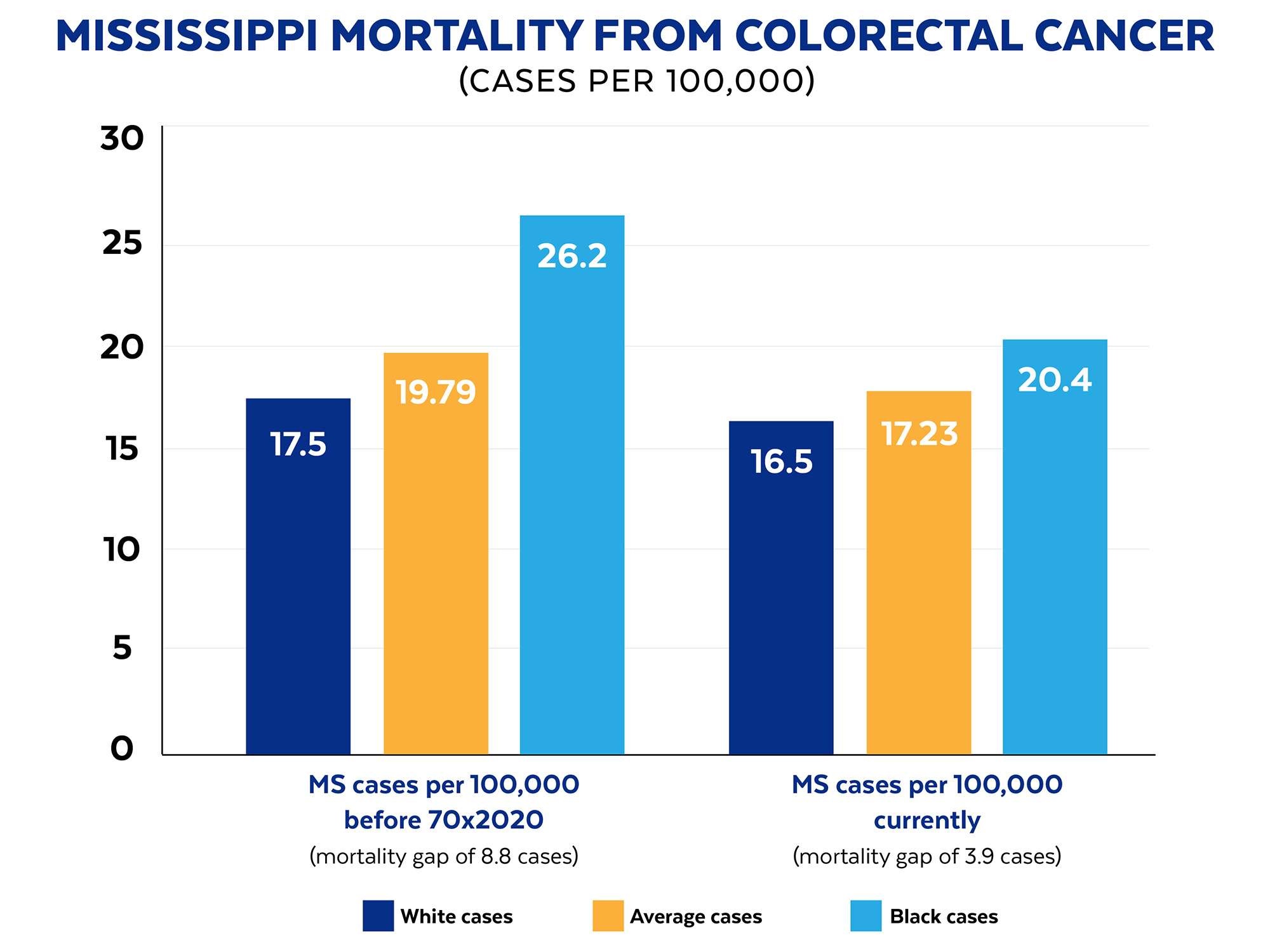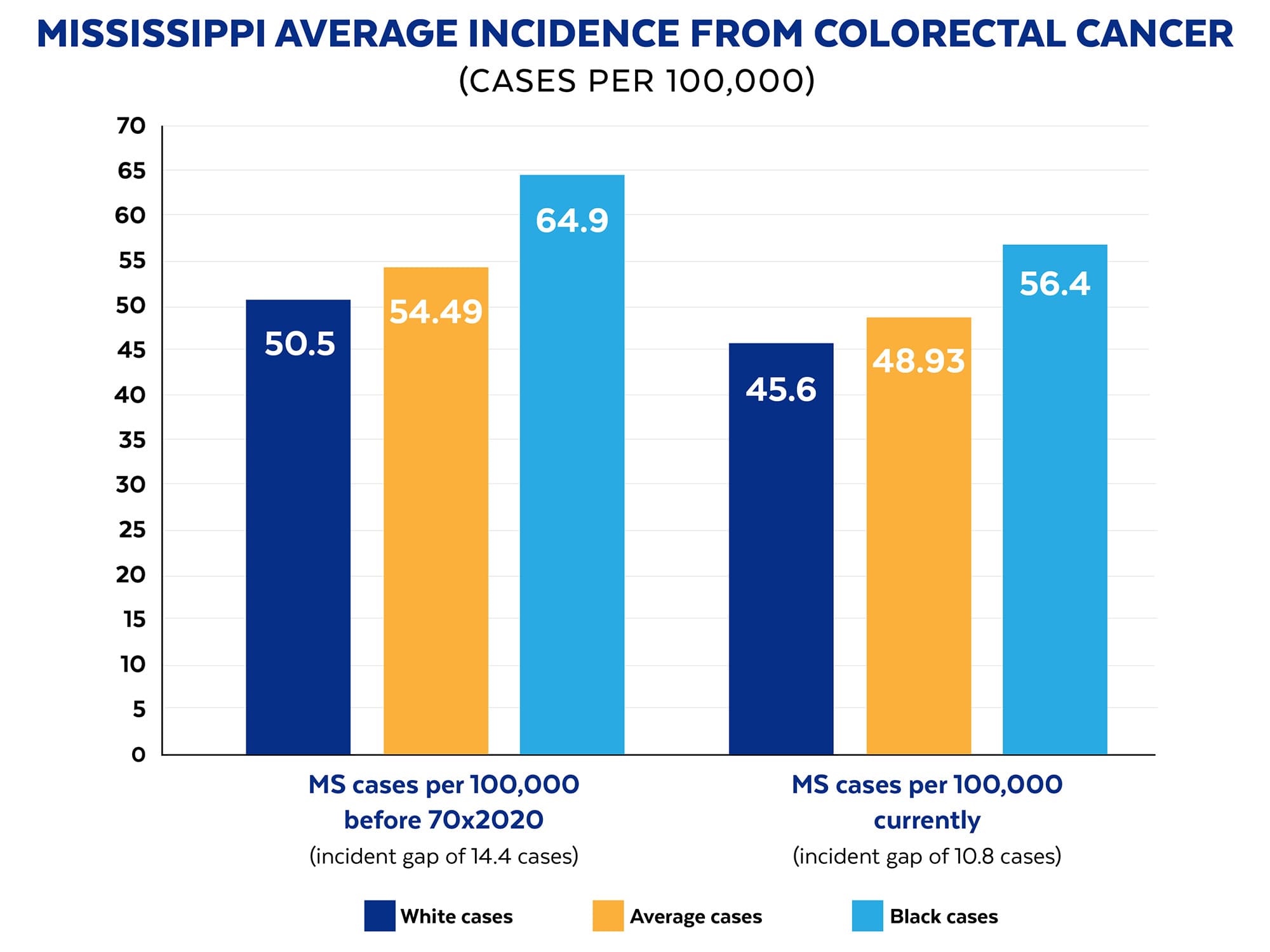It’s official: 70 percent of eligible Mississippians screened for colorectal cancer by 2020

Mississippi’s 70x2020 Colorectal Cancer Screening Initiative had a lofty goal: to see 70 percent of eligible Mississippians screened for colorectal cancer by the end of 2020.
Through six years of hard work and constant vigilance, the grassroots initiative – which timed out in 2020 and was replaced by the Mississippi Colorectal Cancer Roundtable – can proclaim success. The Centers for Disease Control and Prevention has released data for the year 2020, reporting a crude rate of 70.9 percent of Mississippians who are up to date with colorectal cancer screening.
The CDC also reports an age-adjusted rate of 69.9 percent of Mississippians meeting the criteria for colorectal cancer screenings, which is within the margin of error of the 70X2020 goal of 70 percent compliance by the year 2020. That’s from a starting point of about 55 percent compliance.
The data also shows that since the 70X2020 initiative began in 2014, the number of Mississippians diagnosed with colorectal cancer and the number who die of it has decreased. The data for incidence and mortality were provided by the Mississippi Cancer Registry at UMMC’s Cancer Center and Research Institute.

“The great news is that we met the goal we set, thanks to everyone around the state who took part,” said Dr. Roy Duhe, professor of pharmacology, toxicology and radiation oncology in the CCRI and president of the state Roundtable.
“The other wonderful news is that we accomplished one of our strategic goals, which was to address population-based disparities in who gets screened in Mississippi,” he said of a history of significantly higher numbers of white Mississippians screened than minority Mississippians.”
There was a huge gap before 70X2020, between white and African American Mississippians, in incidence of colorectal cancer and mortality from it.
“We went from having a screening gap of over 11 percent to having eliminated that gap,” Duhe said.
The progression of the data, taking into consideration a four-year average from 2006-10 and based in part on Mississippi Cancer Registry data from 2018:

Today, the average Mississippi mortality from colorectal cancer is 17.23 cases per 100,000 population, with Black mortality dropping to 20.4 cases per 100,000 population and white mortality dropping to 16.5 cases per 100,000 population, representing a mortality gap of 3.9 cases per 100,000 population.

Today, the average incidence of colorectal cancer in Mississippi is 48.93 cases per 100,000 population, with Black incidence standing at 56.4 cases and white incidence at 45.6 cases, representing a gap in incidence of 10.8 cases per 100,000 population.
On current screening rates, however, the figures are remarkable, Duhe said. Statistics from 2020, the most recent available, show that among Mississippians surveyed between ages 50-75 who were eligible for colorectal cancer screening, right under 70 percent of white respondents and right above 70 percent of Black respondents, had received one or more of the recommended screening tests within the recommended time interval for their particular health status. That’s an improvement over a 58.1 percent compliance rate for white residents and 46.8 for Black residents – an 11.3 percent gap.
“With screening, you expect to see the mortality drop,” Duhe said. “Catch the cancer early and treat it early, and people are much less likely to die.”
The American Cancer Society recommends that people at average risk of colorectal cancer start regular screening at age 45 – until recently, that recommendation was age 50 – via a stool-based test to check for signs of cancer, or a colonoscopy that looks at the colon and rectum.
People at increased or high risk, however, might need to start screening before 45 or be screened more often. Risk factors include a family history; having certain types of polyps, or a personal history of colorectal cancer with certain types of polyps; a history of inflammatory bowel disease; or a personal history of radiation to the abdomen or pelvic area to treat cancer.
People who are in good health who have a life expectancy of more than 10 years should get regular colorectal cancer screening through age 75.
Dr. Richard Summers, UMMC’s associate vice chancellor for research, CCRI interim director and the Billy S. Guyton Professor of Emergency Medicine, notes that mortality in Mississippi patients with colon cancer isn’t where it needs to be.

“Many Mississippians reside in rural environments and under disparate conditions, which makes access to maintenance of medical care challenging,” Summers said. “This results in late presentations for these hidden cancers, often after there is bowel obstruction or bleeding.
“A population health effort for screening is critical for early detection and actually saves lives and costs of health care.”
The Mississippi Legislature passed a resolution to establish the Mississippi Colorectal Cancer Roundtable to be aligned with American Cancer Society efforts to promote colorectal cancer prevention and early detection through establishment of state-by-state Roundtables. The Medical Center’s CCRI is designated to organize the state Roundtable.
Both 70X2020 and the Roundtable targeted education and wellness, creating awareness across the state about colonoscopies revealing polyps that can be removed before they’re malignant, and the use of stool testing to help detect colorectal cancer earlier, when treatment is more successful.
The takeaway from the good news, Duhe said, is that “further vigilance is required to make this permanent.” A significant work area is people ages 45-50, who are the least likely to desire screening.
“The older people get, the more they realize this is something they need to do,” Duhe said. “We’re going to have to work harder due to the earlier age to begin screening. We’ve started to see an increase in early onset colorectal cancers.
“We have to pick up our game if we want to meet the new goal of 80 percent in every community. We are setting a higher bar.”

